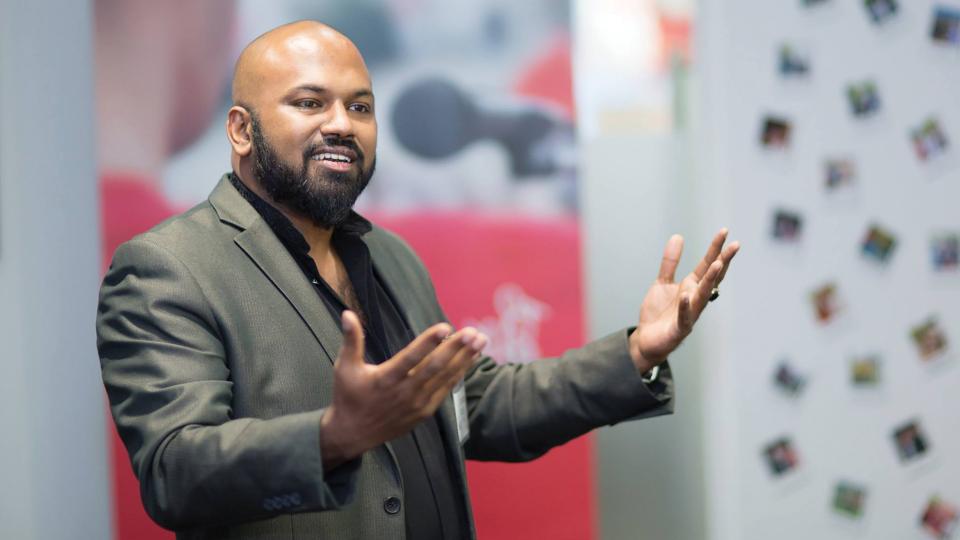From the March 2016 issue of The Rotarian
One of the keynote speakers at this year’s Rotary International Convention in Korea will be Dananjaya Hettiarachchi, the founder and CEO of a human resources development and communications firm in Sri Lanka. In addition to being a much-sought-after motivational speaker, trainer, and executive coach, Hettiarachchi holds claim to a title that many seek but few attain: world champion of public speaking.
In 2014, Hettiarachchi bested some 33,000 competitors from around the world to become the first Asian-born winner of the Toastmasters International World Championship of Public Speaking, which began in 1938. In his championship speech, “I See Something,” Hettiarachchi recounted how he reversed the course of a troubled youth and got on a path to success after being introduced to a mentor who told him, “I see something in you, but I don’t know what it is.”
THE ROTARIAN: Will it be a special challenge to speak at the Rotary Convention? Have you decided on a topic?
HETTIARACHCHI: More than a challenge, it will be a privilege. Since speaking is what I do day in and day out, it is an opportunity that I look forward to. I have focused on a broader theme of bringing out the leader in you first and how, during that process, you could contribute more toward the people around you and society at large.
TR: What are the essential elements of a good speech?
HETTIARACHCHI: One of the most important elements is to be authentic. Your voice is as unique as your fingerprint. Your voice, tone, rate, pitch, and volume tell who you are. People need to buy into you before they buy into what you’re saying or selling.
TR: You have said the most important part of a speech is the pause. Could you explain that?
HETTIARACHCHI: Silence speaks volumes, and a well-placed pause can speak volumes. It is that few seconds of silence that allows the audience to contemplate what you have said and allows the weight of your content to sink in.
TR: Your winning speech, “I See Something,” seems almost as much a stand-up comedy routine as a speech. How important is humour in a speech?
HETTIARACHCHI: Humor is an essential part of communication and public speaking. I wouldn’t classify it as a stand-up routine because stand-up comedy has no message; it has only an entertainment aspect. Humour allows a speaker to connect because it is universal. A speaker uses humour to create a connection that will allow him or her to position a more meaningful message with an audience. In an era when attention spans have diminished, keeping an audience entertained is vital to delivering your message.
TR: What is the more important element of a speech – style or content?
HETTIARACHCHI: I think they are equally important. Content helps you change the mindset of the audience; style helps you to be remembered and keeps people coming back for more.
TR: What is the worst mistake a speaker can make?
HETTIARACHCHI: Making the speech presentation about himself or herself instead of focusing on the message and the audience.
TR: You are the first Asian to win the Toastmasters International World Championship. Contestants are required to speak in English, and your native language is Sinhalese. What challenges does it present to learn to speak in a second language?
HETTIARACHCHI: Learning the language is not that difficult. Using it with confidence in front of native speakers is the challenge. This requires many cycles of learning through failure.
TR: What brings you the most satisfaction in the work you do?
HETTIARACHCHI: It’s when people tell me that I have changed them in some way through the workshops and keynotes that I do. I speak in many countries on peak performance and self-leadership. I live for those moments where the stories, lessons, and insights that I share help people find their purpose and allow them to perform at their peak.
TR: Any insights you would like to share about self-improvement and achieving success?
HETTIARACHCHI: The importance of mentors and teachers in creating a better society and world. The importance of helping yourself first before you help others, to make things more sustainable. The importance of the environment in success – how engineering the right environment for people is sometimes better than charity in allowing them to become successful. The power of changing one person at a time has a compound effect.
Hear Dananjaya Hettiarachchi speak at the 2016 Rotary Convention, 28 May-1 June in Korea. Register at www.riconvention.org.
The Rotarian
